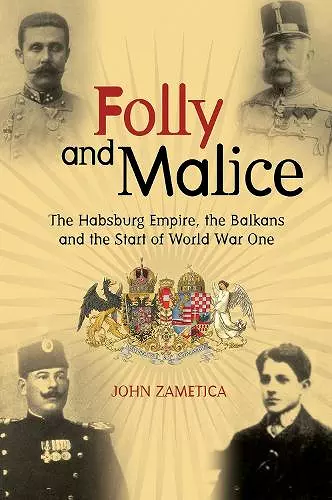Folly and Malice
The Habsburg Empire, the Balkans and the Start of World War One
Format:Hardback
Publisher:Shepheard-Walwyn (Publishers) Ltd
Published:28th Jun '17
Currently unavailable, our supplier has not provided us a restock date

Examining the origins of the First World War has been called "the ultimate who dunnit". In his book, published on the anniversary of the assassination said to have triggered it, John Zametica, focusing on the Habsburg Empire and the Balkans, re-examines the evidence. This leads to a number of radical new interpretations and some remarkable revelations about the events that in 1914 led to the outbreak of the First World War. The centenary of WW1 has spawned many new books on the subject. Utilizing a wide range of Serbo-Croat and German-language sources, the author overturns most of what we have been led to believe about the respective culpability of Austria-Hungary and Serbia for the outbreak of war. He also re-examines the role of Russia and Germany in this. The reader is left to conclude that Britain was drawn reluctantly into the war in defence of two small countries, one on each side of Europe, which had been attacked simultaneously by Austria-Hungary and Germany without provocation. In Folly and Malice John Zametica reveals that: The First World War was kick-started by an ailing Austria-Hungary which believed that waging a successful war was the only way it could remain a Great Power; This empire, with its eleven squabbling nations, and with its statesmen unwilling to contemplate any meaningful internal reform, was the real powder keg of Europe; Franz Ferdinand, the Austro-Hungarian Heir to the Throne normally portrayed as a likely enlightened reformer of the Empire, was actually seeking to destroy the Dualist political compromise between Austria and Hungary and replace it with his own centralist autocracy; Serious antagonism between the Austria-Hungary and Serbia really only began as late as 1906 and had on the whole almost nothing to do with the supposedly crucial 'South Slav' question; Gavrilo Princip, Franz Ferdinand's assassin, was impelled to do his deed by a Yugoslav ideology conceived and propagated from within Habsburg Croatia, not independent Serbia; The notorious Black Hand, the secret Serbian officers' organisation, far from planning to assassinate Franz Ferdinand during his visit to Bosnia, was in May-June 1914 busy plotting to overthrow civilian rule in Serbia and replace it with a military-led dictatorship; The famous Serbian warning to Vienna, intended to thwart Franz Ferdinand's assassination, was the work of...
“It is an absolutely fascinating story …”; “… another wonderful page-turner … clearly demonstrates from all available evidence, that Serbia did not want a war in 1914…”; Emeritus Professor Alan Sked, www.ThinkScotland.org. Professor Sked also mentions it in The Times Literary Supplement.; “… a seminal work which forces readers to reflect further on issues they had thought settled … a powerfully argued work whose conclusions will be carefully studied by historians for many years.”; Vernon Bogdanor, International Affairs; “Through meticulous research he proves beyond doubt that the notorious Serbian terrorist group the Black Hand did not plan the plot, nor was the government involved … His vivid description of the murders on Jun 28 is the best we have.”; Mark Cornwall, The Times Literary Supplement; “Folly and Malice is a breathtaking display of how expert historical sleuthing works”; “Zametica’s erudition is awesome, the pace and detail of the narrative exciting”; Prof. Paul Miller of McDaniel College Washington DC in the Nov 20 edition of Hungarian Studies Review; “This painstaking and meticulous piece of scholarship offers a challenge to some widely-held assumptions about the events which led up to the outbreak of World War One … This book has been a revelation to me and, whilst it might be considered controversial in some quarters, its challenge to existing thinking makes it a very significant contribution to the continuing debate about the causes of the Great War.”; Trevor James, The Historian; “John Zametica has been controversial in his time, but let that not detract from what is a brilliant piece of historical writing on one of the most important aspects of the outbreak of the First World War. Not since Vladimir Dedijer’s The Road to Sarajevo in 1967 has a book of this power and authority addressed the subject. John Zametica’s scope is even wider than Dedijer’s, and his conclusions more compelling.”; Professor Sir Hew Strachan; “Zametica’s will be the automatic reference point for any future discussion … this writer has gripped the detail of the assassination story more fully than anyone before him … The book is both important and convincing. It will be essential reading for history undergraduates and should appeal to a broader audience …”; Dr Michael Stenton; “I hope it will not be too long before it gets critical acclaim and enters the canon as a seminal work that redefined how scholars and the rest of us look at First World War history. It’s a long and complex book full of painstaking research of both primary and secondary sources, creating one of the most exciting academic texts I’ve come across in ages.”; Tijana Delic, Britic; “If you consider yourself a scholar of history, or if your heritage goes back to these troubled lands, or if you merely wish to learn more about a region systematically and deliberately misrepresented for the past century, this book is for you.”; Gray Falcon
ISBN: 9780856835131
Dimensions: unknown
Weight: unknown
416 pages